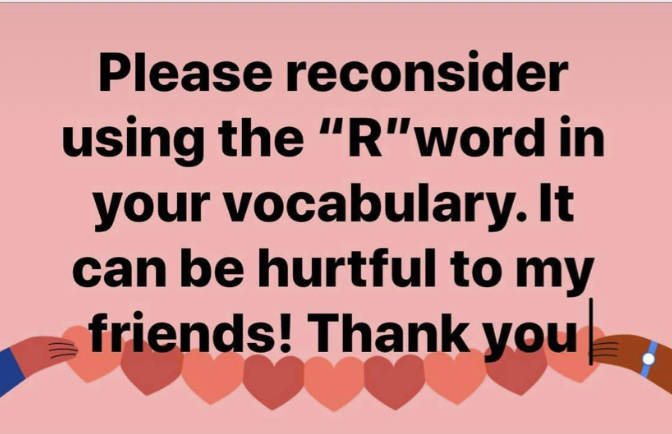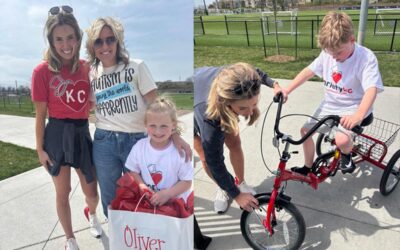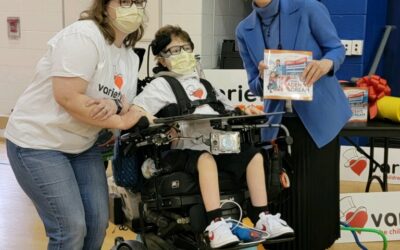It’s time to be respectful!
These are anxious times, and name-calling or put downs add to the divisive feelings. Unfortunately, some of that poor behavior is exhibited by people in leadership positions and is rightfully called out on media and social posts. Variety KC feels this is a good time to provide some education about words that hurt, and words to avoid.
Maybe an adult stumbles on the sidewalk and claims, “I’m such a spaz,” or a child on the playground uses the R-word (shortened slang for mental retardation).
Most people don’t intentionally mean to hurt someone, but here’s the problem. These terms were used as an insult, a reference to someone who is uncoordinated or doing something stupid. Attaching a term associated with a disability is hurtful and derogatory toward people with a disability. Even when used unintentionally, these words reinforce negative stereotypes.
When the same words are used to intentionally hurt someone with a disability, or physical movements are mimed and mocked – that is a whole other level of inappropriate and awful behavior.
Avoiding hurtful terms is not being politically correct, it is about showing people the same respect you want for yourself.
Sometimes, and fortunately far less often than in the past, you’ll hear a friend or co-worker casually use the R-word or something similar. It can be an uncomfortable situation, but you will feel worse if you don’t address it. After listening to our Variety parents and families, we recommend pulling them aside and saying, “You probably don’t even realize that word can be hurtful to others. Is it alright to use something like “silly” or “ridiculous” instead?’” This lets them gently know that the word isn’t acceptable and that there are lots of alternative words that aren’t offensive.
What other words are problematic? When a person has a disability, it doesn’t define them so others shouldn’t use inappropriate words to define them either! We’ve checked with our Variety family and some of our partners in the industry to come up with the start of a guide to follow when talking about a person with a disability. Terms evolve over time as we learn to best address this sensitive topic. Not everyone will agree with these and we welcome your addition and input.
Don’t say: “Normal Person.” Say instead: “Person without a disability”
Don’t say: “handicapped, crippled, deformed, invalid.” Say instead: “A person with a disability”
Don’t say: “Retarded, tard, moron, or intellectually challenged.” Say instead: “A person with an intellectual disability”
Don’t say: “Mongol, mongoloid, downs.” Say instead: “A person with Down syndrome”
Don’t say: “Spastic, spaz,” Say instead: “A person with a disability or a person with cerebral palsy”
Don’t say: “paraplegic, quadriplegic, paralyzed,” Say instead: “A person with paraplegia, person with quadriplegia”
Don’t say: “confined to a wheelchair, wheelchair bound,” Say instead: “A person who uses a wheelchair”
Don’t say “dumb” when referring to someone who doesn’t speak. Say instead: “non-verbal”
Don’t say: “dwarf, midget, little person, vertically challenged.” Say instead: “short-statured person”
Don’t say “crazy, insane, lunatic, maniac, mental, psycho, psychopath, skitzo.” Say instead: “A person with a mental illness”
Don’t say “institution, psych hospital, looney bin.” Say instead: “mental health clinic”
Now that we’ve covered how to talk about a person who has a disability, let’s cover how to talk to them. Just say “hi!”
Be yourself, and talk to them directly with eye contact. Don’t refer to their caregiver or family and don’t assume they can’t understand you or respond.
Always ask before jumping in to help, they may not want or need it. If they have a service animal, don’t talk or pet it. These are trained animals who are on the job.
Don’t assume that someone with a disability has other disabilities. For example, when speaking to someone in a wheelchair or with low vision, there’s no reason to raise your voice as if they could not hear you.
When appropriate, offer your name and ask their name. Names give us an identity and are the starting point of creating a bond. Here is a link to the National Disability Association if you would like to see some additional terms and information.
http://nda.ie/Publications/Attitudes/Appropriate-Terms-to-Use-about-Disability/




